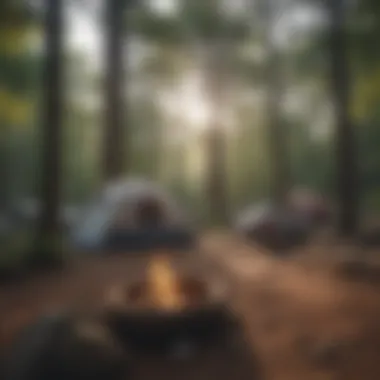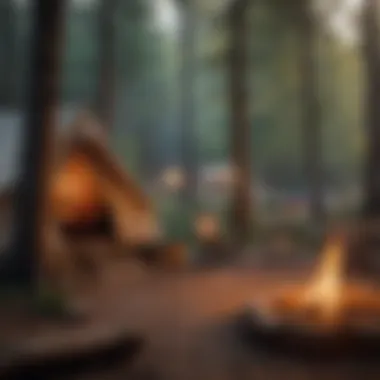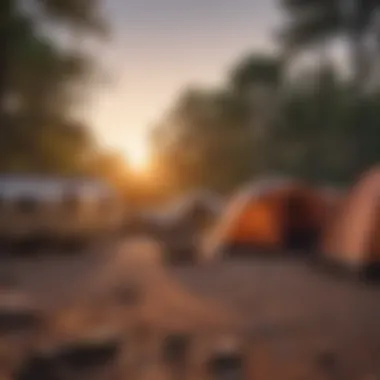Explore the Best Camping Spots in Wisconsin Dells


Intro
Wisconsin Dells stands as a premier destination for outdoor enthusiasts and camping aficionados. Nestled in the heart of Wisconsin, this area is known for its stunning landscapes and rich biodiversity. With an array of camping options, from rustic sites to modern facilities, the choices cater to a wide range of tastes and skill levels. Understanding what this region offers is essential not only for a fulfilling camping experience but also for respecting the ecological significance of the area. This article aims to provide an engaging guide to the best camping opportunities in Wisconsin Dells, covering key features, nearby natural attractions, and important considerations for beginner and experienced campers alike.
Unique Features of Camping Sites
Camping in Wisconsin Dells presents much more than just pitching a tent. Each site has unique characteristics.
- Variety of Settings: From forested areas to lakeside views, the options are countless.
- Amenities: Many locations provide essential facilities such as restrooms, fire pits, and picnic tables.
- Recreation Opportunities: Whether fishing, hiking, or canoeing, outdoor activities abound.
Selecting the ideal camping site is vital for an enriching adventure. Consider the following aspects when choosing:
- Proximity to Attractions: Being near natural landmarks can enhance the experience.
- Wildlife Viewing: Many sites are located in areas populated by diverse fauna.
Prelims to Camping in Wisconsin Dells
Camping in Wisconsin Dells offers a unique experience shaped by the area's rich natural beauty and diverse wildlife. This region, often referred to as the "Waterpark Capital of the World," provides not only fun but an escape into nature. The combination of stunning landscapes and outdoor activities attracts many visitors eager to immerse themselves in the great outdoors.
The importance of this topic cannot be overstated. Understanding the various camping options available helps both novice and seasoned campers to select the ideal site for their needs. Wisconsin Dells boasts a range of environments from traditional campgrounds to glamping sites, facilitating a variety of preferences and tastes. For instance, families may prefer campgrounds with extensive amenities while solo adventurers might seek quieter, backcountry options.
Moreover, camping here allows for exploration of the ecological significance of the area. Wisconsin Dells is home to rivers, lakes, and woodlands that support a myriad of wildlife species. By learning about these habitats, campers can gain a deeper appreciation for nature. This knowledge is essential for responsible camping and contributes to wildlife conservation efforts.
When planning a trip, it's vital to consider seasonality and weather patterns, as they significantly influence the camping experience. Understanding what to expect can help in making informed decisions about activities and preparation.
"Camping is an opportunity to connect with nature and understand the ecosystems we are part of."
Geography and Climate
Understanding the geography and climate of Wisconsin Dells is critical for campers and outdoor enthusiasts. The unique topography and seasonal weather patterns influence the types of activities available, as well as the overall camping experience. This region's geographical features offer diverse landscapes, from rolling hills to pristine lakes, each presenting different opportunities for exploration and relaxation.
Overview of Terrain
Wisconsin Dells is known for its distinctive terrain characterized by steep cliffs, deep river valleys, and numerous freshwater lakes. The Wisconsin River carves through the area, creating stunning rock formations and scenic views. These geological features provide a backdrop for various outdoor activities, including hiking, fishing, and kayaking.
The driftless region, which Wisconsin Dells is part of, has avoided glaciation, resulting in unique geological formations. Campgrounds nestled near these natural landmarks offer not only aesthetic beauty but also easy access to trails and water. Additionally, the area features lush forests that are rich in biodiversity, making it an ideal location for wildlife watching and nature photography.
Seasonal Weather Patterns
Wisconsin Dells experiences a range of seasonal weather patterns that significantly impact camping plans. Campers should be aware of the distinct changes that occur throughout the year.
- Spring (March to May): Spring brings milder temperatures, making it a perfect time for camping. The melting snow leads to vibrant blooms and the awakening of wildlife. However, rain showers can be frequent, so preparation for wet conditions is essential.
- Summer (June to August): Summer is the peak camping season, with warm temperatures and long daylight hours. Numerous activities take place, including swimming and hiking. However, thunderstorms can occur, especially in the afternoons, leading to sudden changes in weather.
- Fall (September to November): Autumn showcases brilliant foliage as the leaves change colors. The climate becomes cooler, and campers can enjoy fewer crowds. However, nighttime temperatures can drop, so appropriate gear is needed for warmth.
- Winter (December to February): While winter camping is less common, the snow-covered landscapes offer a different kind of beauty. For the adventurous, winter sports like snowshoeing and ice fishing are available. Protection against cold temperatures becomes essential during this season.
Understanding these patterns aids in choosing the right time for your trip and ensuring a safe experience.
Types of Camping Options
Camping in Wisconsin Dells offers various options that cater to diverse preferences and skill levels. Understanding the types of camping available is essential for planning a satisfying trip in this area. Each camping style comes with its own set of benefits and considerations, helping campers connect with nature and enjoy the outdoors in different ways.
Traditional Campgrounds
Traditional campgrounds are a staple for many outdoor enthusiasts. These facilities often feature designated camping spots equipped with essential amenities, such as picnic tables and fire pits. They provide both organized sites and more open areas for setting up tents.


Camping in traditional campgrounds appeals to families and beginners. It offers a sense of safety and community, allowing campers to share experiences and advice. Commonly found near lakes or rivers, these campgrounds enhance the experience with scenic views and recreational activities.
In Wisconsin Dells, Devil's Lake State Park is a notable traditional campground, where visitors can hike, swim, and fish.
RV Parks
RV parks provide a different camping experience focused on convenience and comfort. These parks typically offer well-maintained facilities, including hookups for water, electricity, and sewage. This setup is favorable for travelers who prefer staying in their vehicles but still want a connection to nature.
The advantage of RV parks is the access to various amenities, such as laundry services and recreational rooms. Many RV parks are located near attractions, making it easy to explore Wisconsin Dells' famous sights. Here, visitors can enjoy both the adventure of camping and the comfort of home.
For those looking for quality RV parks, Wisconsin Dells KOA is highly recommended. It combines both comfort and proximity to area attractions, making it a popular choice.
Backcountry Camping
Backcountry camping invites seasoned campers to experience nature in its raw form. This option allows individuals to venture into less developed areas, offering solitude and a deeper connection to the wilderness. Campers must be prepared for self-sufficiency, carrying necessary gear and finding their own sites.
The main appeal of backcountry camping is its authenticity. It provides an escape from crowded campgrounds and a chance to observe local wildlife in their habitats. Campers must understand local regulations and safety measures before embarking.
Explorers should prepare thoroughly, ensuring they carry maps, water purification systems, and first aid kits. Wildlife encounters can be breathtaking yet unpredictable, so awareness of surroundings is crucial.
Glamping Sites
Glamping, or glamorous camping, combines the enjoyment of being outdoors with luxurious comforts. This option is suitable for those who wish to experience nature without sacrificing modern amenities. Glamping sites can include lodges, yurts, or safari tents, often furnished with proper beds, electricity, and en-suite bathrooms.
The emergence of glamping in Wisconsin Dells caters to diverse preferences. It attracts non-campers who are curious about outdoor experiences but prefer the comforts of home.
Locations such as the Yurt Village at Mr. B's Campground offer unique experiences that impress those looking for a memorable getaway. These sites often come with all necessary facilities, ensuring a comfortable and enjoyable stay.
Understanding these camping options helps outdoor enthusiasts choose the right experience in Wisconsin Dells. Whether it's the simplicity of traditional campgrounds or the luxurious appeal of glamping, each option promotes a unique way of connecting with the natural world.
Top Campgrounds in Wisconsin Dells
Camping at Wisconsin Dells offers not just an escape, but an adventure amidst natural beauty. This section explores specific campgrounds that provide unique experiences. Selecting the right campground is crucial for ensuring comfort and access to activities. Each site presents particular benefits and supports outdoor enthusiasts. Here, we will examine the characteristics of four prominent campgrounds: Devil's Lake State Park, Wisconsin Dells KOA, Turtle Lake Campground, and River Road Campground.
Devil's Lake State Park
Devil's Lake State Park is one of the most popular destinations for camping. The park features stunning views and hiking trails that connect visitors to the rich landscape. The campground allows easy access to the lake, where one can fish or swim. With well-established sites, it provides restrooms, showers, and picnic areas.
- Natural Attractions: The unique quartzite cliffs surrounding the lake create a breathtaking backdrop. It invites photographers and casual visitors alike to enjoy the scenery.
- Activities: Hiking trails, like the East Bluff Trail, are suitable for all skill levels. They lead to lookout points that showcase the beautiful terrain.
"Devil’s Lake is not merely a location; it embodies a habitat for wildlife and a refuge for nature lovers."
Wisconsin Dells KOA
Wisconsin Dells KOA presents a family-friendly environment. It offers a range of accommodations from tents to cabins. This campground is known for its amenities, making camping accessible and comfortable. Amenities include a pool, playground, and organized activities throughout the summer.
- Family Focus: The on-site activities, such as movie nights and themed events, engage all ages. This makes it an ideal family destination.
- Convenience: Grocery stores and essential services are nearby, ensuring guests have what they need during their stay.
Turtle Lake Campground
Turtle Lake Campground offers a different vibe, focusing more on rustic experiences. It is smaller and often less crowded than larger parks. This makes it suitable for those seeking peace and solitude in nature. The lake allows for fishing and canoeing, providing an intimate connection with the environment.
- Wildlife Viewing: The area is rich in biodiversity. It is common to spot deer and various birds.
- Campsite Environment: Sites are more spacious, allowing for privacy and personal space.


River Road Campground
River Road Campground is noted for its proximity to the Wisconsin River. This location is advantageous for activities like kayaking and tubing. Sites are nestled among trees, providing shade and a serene atmosphere. The campground features necessary facilities while maintaining a rustic setting.
- Adventure Haven: Great for water sports enthusiasts, the river activities attract many thrill-seekers in summer.
- Social Atmosphere: The layout of the campground promotes interaction among guests, making it easy to meet fellow campers.
Each of these campgrounds presents distinct experiences. Understanding their features helps refine your camping choices in Wisconsin Dells.
Amenities and Facilities
Camping in Wisconsin Dells offers a unique way to experience nature. However, the success of a camping trip often hinges on the amenities and facilities available. These elements enhance comfort, safety, and overall enjoyment during your stay.
Restroom and Shower Facilities
Modern campgrounds in Wisconsin Dells typically provide restroom and shower facilities, which are essential for maintaining hygiene. While some might see this as a trivial aspect, having clean and well-maintained restrooms can significantly improve the camping experience. Campers enjoy the convenience of nearby facilities, especially after a long day of outdoor activities. Therefore, checking the availability, cleanliness, and accessibility of these facilities before making a reservation is wise.
Picnic Areas and Fire Pits
Another important amenity for campers is access to picnic areas and fire pits. These spaces enable visitors to unwind, share meals, and bond with family or friends in a natural setting. Fire pits serve a dual purpose, providing warmth and a place for cooking or toasting marshmallows. When selecting a camping site, consider the size and condition of picnic tables and fire pits. Locations that offer these amenities often contribute to a more memorable camping experience.
Access to Trails and Lakes
The proximity of campgrounds to trails and lakes cannot be overlooked. Whether you are an avid hiker or enjoy a serene day of fishing, having direct access to these natural features enriches your stay. Many Wisconsin Dells campgrounds offer immediate access to scenic trails and lakes. Researching trail conditions and water quality beforehand can make activities more enjoyable and safe.
Laundry Facilities and Stores
For longer camping trips, having laundry facilities and stores nearby can be a significant comfort. A laundromat ensures that you can keep your clothing fresh during your stay. Additionally, nearby stores can provide convenience for last-minute supplies or snacks. When planning a camping trip, it is essential to check on the availability of these facilities.
In summary, the amenities and facilities in Wisconsin Dells play a crucial role in shaping the camping experience. With thoughtful consideration and planning, campers can select the ideal site that meets their needs, allowing them to focus on enjoying the serenity of nature.
Wildlife and Conservation
Camping in Wisconsin Dells offers more than just beautiful landscapes and recreational activities; it also provides a unique opportunity to engage with the local wildlife and learn about conservation efforts. Understanding the ecological dynamics of this area enriches the camping experience, highlighting the need for respectful interaction with nature.
Conservation is crucial not only for the well-being of various species but also for maintaining the overall health of ecosystems. Through responsible camping practices, visitors can support these efforts, ensuring that the natural beauty of Wisconsin Dells remains for generations to come. This section aims to shed light on native species you might encounter and the importance of following wildlife regulations.
Native Species to Observe
Wisconsin Dells is home to a diversity of wildlife that captivates visitors. While camping, you may come across various species, making it an enriching experience. Here are some notable examples:
- White-tailed Deer: Common across the region, these graceful creatures are most active during dawn and dusk. They are often spotted grazing near campsites.
- Eastern Bluebird: With their striking blue plumage, these birds bring a splash of color to the landscape and are frequently seen fluttering around.
- North American Beaver: Known for their dam-building skills, beavers play an important role in maintaining wetland ecosystems. If you're quiet, you might spot one at work.
- Great Horned Owl: These majestic birds of prey are adept hunters and often heard at night. Pay attention to their distinctive hooting calls.
Additionally, various reptiles, amphibians, and smaller mammals like raccoons and foxes can also be observed. Each species contributes to the intricate web of life that defines the region's ecosystem.
Respecting Wildlife Regulations
When camping in Wisconsin Dells, adhering to wildlife regulations is essential. These regulations exist to protect both wildlife and visitors. Disregarding them can have serious consequences. Here are some key points to consider:
- Stay on Designated Trails: This minimizes the disruption to wildlife habitats and protects plant life. Venture off the path only when absolutely necessary.
- No Feeding Wildlife: Feeding animals creates dependency and can lead to aggressive behavior. Wild animals need to rely on their natural food sources.
- Proper Waste Disposal: Always dispose of food scraps and garbage in designated containers. Inadequate waste management can attract wildlife to campsites, leading to safety issues.
- Observe from a Distance: While it may be tempting to get close for a better view, it is vital to maintain a respectful distance. This ensures safety for both you and the wildlife.
By following these guidelines, you contribute to the preservation of Wisconsin Dells' natural environment and promote a thriving ecosystem for future visitors to enjoy. Remember, the experience of observing wildlife can be both thrilling and educational, enhancing your overall camping adventure.


Safety Guidelines
Safety is a critical component of any camping excursion, particularly in places as diverse and ecologically rich as Wisconsin Dells. Proper understanding and application of safety guidelines can significantly enhance the camping experience. They help prevent accidents, reduce risks associated with nature, and promote a more enjoyable setting for all campers.
Managing Weather Conditions
Weather can change rapidly in Wisconsin, making it essential for campers to remain prepared. Familiarize yourself with the local climate patterns before your trip. Be mindful of potential thunderstorms, heavy rain, or sudden temperature drops.
- Check Forecasts: Always monitor weather updates before heading outdoors. Use reliable sources like weather apps or local news stations.
- Dress Appropriately: Layer clothing to adjust to changing conditions. Waterproof jackets can provide added protection from unexpected rain.
- Seek Shelter: If severe weather is approaching, identify safe shelter options in advance. Tents are not reliable during thunderstorms; look for established buildings or structures.
Fire Safety Precautions
Fires can bring warmth and comfort, but they also pose risks. Understanding fire safety is essential for preventing wildfires and injuries. Wisconsin's natural environment can be susceptible to fires, especially during dry spells.
- Designated Areas: Always use designated fire rings or pits when creating a fire. This minimizes the risk of spreading flames to foliage or dry areas.
- Extinguishing Fires: Before leaving, ensure that the fire is completely out. Douse it with water, and stir the ashes to confirm no embers are still smoldering.
- Local Regulations: Follow all local fire regulations. In certain conditions, campfires may be prohibited to prevent wildfires. Always check for any alerts before starting a fire.
Wild Animal Safety Tips
Wildlife is prevalent in Wisconsin Dells, and understanding how to coexist safely with animals is crucial. Mishandling encounters with wildlife can lead to dangerous scenarios for both the animal and humans involved.
- Proper Food Storage: Use airtight containers and bear-proof lockers if available. Keep food away from your sleeping area to prevent attracting animals.
- Avoid Feeding Wild Animals: Feeding encourages animals to approach humans, which can lead to aggressive behavior. Maintain a respectful distance.
- Know Animal Behavior: Familiarize yourself with local wildlife and how they behave. Understanding their habits can help avoid unwanted encounters.
In summary, following safety guidelines minimizes risk and ensures a memorable camping experience in Wisconsin Dells. Prioritize preparation and awareness, and you will enhance your outdoor adventure.
Preparing for Your Camping Trip
Preparing for a camping trip can set the tone for your experience in Wisconsin Dells. Camping is not just about pitched tents and campfires; it’s a complete adventure that requires thoughtful planning. By being prepared, campers can avoid unpleasant surprises, enhance their enjoyment, and ensure safety in the great outdoors. Here, we explore essential aspects for an enriching camping experience.
Essential Gear and Supplies
Gear selection is critical for any successful camping trip. Finding the right equipment for your needs increases comfort and functionality while in the wilderness.
- Shelter: Choose between tents, hammocks, or cabins based on personal preferences. Thicker fabrics provide better insulation.
- Sleeping Gear: A high-quality sleeping bag and pad significantly improve rest quality. Opt for temperature ratings suitable for seasonal camping.
- Cooking Supplies: Portable stoves, lightweight cookware, and utensils are essential. Don’t forget a can opener!
- Clothing: Layering is key. Bring moisture-wicking base layers, insulating mid-layers, and waterproof outer layers.
- First Aid Kit: Essential for dealing with minor injuries. Include antiseptic wipes, band-aids, pain relievers, and allergy medications.
Having the appropriate gear simplifies daily tasks and keeps campers prepared for varying weather conditions. Proper preparation can lead to peace of mind, allowing you to fully immerse yourself in the natural beauty of Wisconsin Dells.
Meal Planning and Cooking
Meal planning is an often overlooked, yet vital area of preparation. The food aspect directly impacts time spent outdoors and social bonding with fellow campers.
- Plan Ahead: Create a meal schedule and choose easy-to-cook recipes. Dehydrated meals and canned foods can suffice for longer stays.
- Cooking Methods: Familiarize yourself with various cooking methods available, like grilling over an open fire or using a propane stove. Each method has its own advantages and challenges.
- Storage: Proper food storage is crucial for avoiding spoilage and wildlife encounters. Use coolers with ice packs and bear-proof containers when necessary.
- Cleanliness: Maintain hygiene to prevent unwanted visitors. Wash dishes promptly and dispose of waste properly. Always follow local regulations regarding food storage and waste disposal.
When planning your meals, consider nutritional value and dietary restrictions within your group. A carefully curated menu contributes to the overall enjoyment of the camping experience, reinforces camaraderie, and ensures that outdoor activities remain high-energy.
“Preparation is the key to success.”
Preparing for a camping trip in Wisconsin Dells involves understanding what gear you need and planning meals that will sustain you. By attending to these details, you create a solid foundation for a memorable and enjoyable outdoor adventure.
Closure
Camping in Wisconsin Dells offers a multifaceted experience that appeals to diverse outdoor enthusiasts. The region's unique blend of natural beauty, wildlife, and recreational opportunities makes it a prime destination for both novice and seasoned campers.
Understanding the key elements of camping enriches one’s experience. The diverse camping options, whether at organized campgrounds or in more secluded backcountry sites, allow for customization based on individual preferences. Selecting the right camping site goes beyond merely finding a spot; it involves recognizing the amenities available, such as restroom facilities, access to nature trails, and opportunities for wildlife observation.
Benefits of Camping in Wisconsin Dells
- Natural Attractions: Camping provides proximity to numerous attractions, including lakes, rivers, and parks that enhance the adventure.
- Ecological Significance: Engaging with the local flora and fauna fosters appreciation for conservation efforts and ecological dynamics.
- Social Connections: Shared outdoor experiences can solidify friendships and family bonds, creating lasting memories during camping trips.
Moreover, awareness of wildlife, popular local species, and regulations gives campers an added layer of safety and respect toward nature. Adequate preparation, including understanding seasonal weather patterns and essential gear, is equally crucial.







